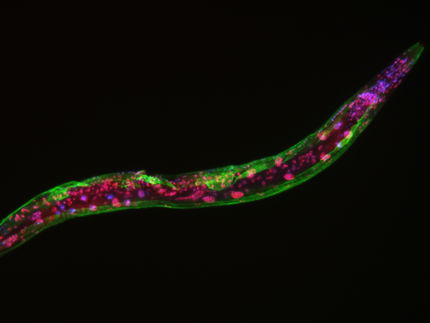How cold temperature prolongs fertility and lifespan
To delay the aging process of the entire organism at cold temperature, germ stem cells communicate with the rest of the body using the hormone prostaglandin, as David Vilchez and his team discovered. A moderate reduction of body temperature can induce a remarkable increase in lifespan. This phenomenon was first described in invertebrates such as worms, and later observed in fish and mice. Although the longevity effects of cold temperature were originally reported over a century ago, little is known about this process. ‘Neurons detect and process cold temperature to delay aging of the reproductive system and therefore extend fertility’, David Vilchez from the Cluster of Excellence CECAD reports. Their new research findings were published in Nature Metabolism.
The most important goal of the organism is to proliferate and keep the next generation coming. To assure this, the germline is especially protected. Living beings distribute most of their energetic resources to protect the germline, while less energy goes into protection of muscles, neurons, intestine and other somatic tissues. Therefore, when the germline is removed, organisms tend to live much longer as shown in worms and fruit flies. In these lines, distinct pathways that extend lifespan eventually affect fertility.
In their study, the researchers were able to show for the first time that under certain conditions such as cold temperature both goals – longevity and fertility – can be reached without sacrificing one of them. Specific neurons sense low temperature and communicate with the germ stem cells that rejuvenate the reproductive system, David Vilchez explains: “They say: don´t age, everything is alright, you can continue generating new germ stem cells.” Then, germ stem cells release the hormone prostaglandin E2 to maintain the quality of proteins in somatic tissues. In addition, prostaglandin E2 increases the levels of a protein called cbs-1 in the intestine. This protein produces the gas hydrogen sulphide – a substance which is known to prevent neurodegeneration and extend longevity in numerous organisms, including mammals. “High levels of this substance could kill you – but certain physiological levels make the worms and other organisms live longer,” as stated by Hyun Ju Lee and Alireza Noormohammadi, researchers involved in this study. Some mechanisms that extend lifespan lead to miserable-looking worms, laying less eggs and moving hardly. “That wasn´t the case here. Our worms lived long and prosper,” David Vilchez adds. Importantly, the researchers found that increasing hydrogen sulphide in the intestine alone was sufficient to extend lifespan even at high temperatures.
The new findings put aging in perspective, as Vilchez says: “Aging is not just a random process, where DNA damages, toxic proteins or other threats accumulate, but rather a regulated process.” Whereas current theories of aging and extensive evidence support that the reproductive system actively promotes the aging of other tissues, the findings indicate that this is not always the case. The researchers observed that increased maintenance of the germline is required for long lifespan at cold temperature. “Our findings provides a proof of regulatory systems that promote both germline and somatic fitness, without the need to sacrifice either fertility or lifespan,” David Vilchez summarizes.
Original publication
Most read news
Other news from the department science

Get the life science industry in your inbox
By submitting this form you agree that LUMITOS AG will send you the newsletter(s) selected above by email. Your data will not be passed on to third parties. Your data will be stored and processed in accordance with our data protection regulations. LUMITOS may contact you by email for the purpose of advertising or market and opinion surveys. You can revoke your consent at any time without giving reasons to LUMITOS AG, Ernst-Augustin-Str. 2, 12489 Berlin, Germany or by e-mail at revoke@lumitos.com with effect for the future. In addition, each email contains a link to unsubscribe from the corresponding newsletter.





















































